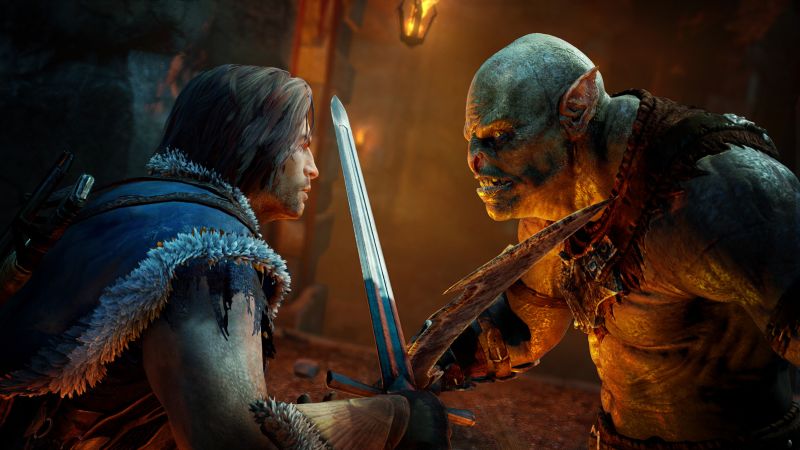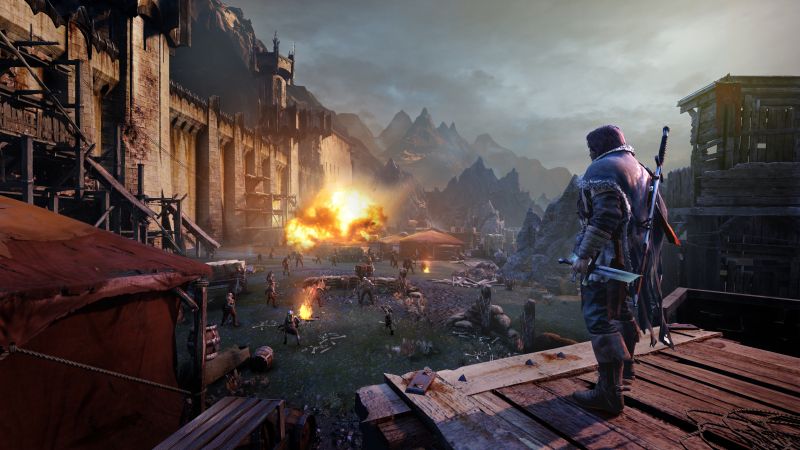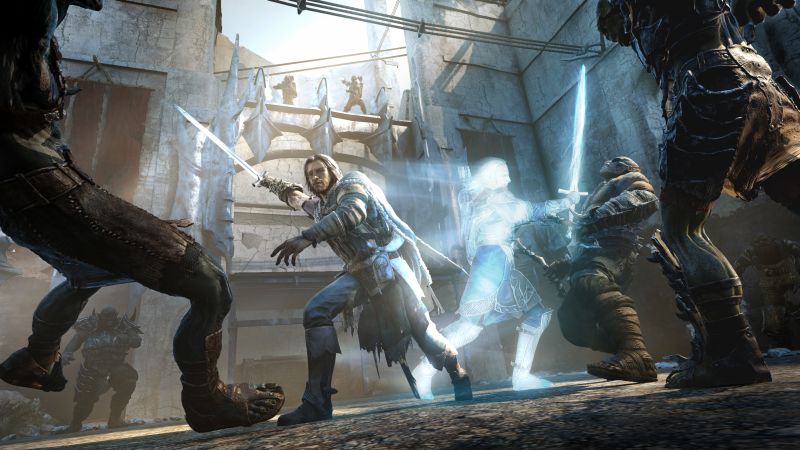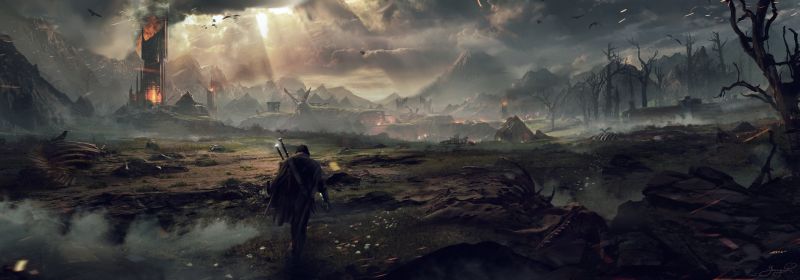
Middle Earth: Shadow of Mordor game has been blatantly put down, cursed, rebuked and reprimanded for being too similar to the Assassin’s Creed franchise and accused for shamelessly stealing from other games. The reality? Far from it.
There is a score of other games that look similar to some other lot and were yet cherished dearly. We have Ninja Gaiden which has looked up to other sources to draw from for its basic gameplay, there’s Army of Two that is strangely reminiscent of Gears of War/Kill Switch and there’s Torchlight II with its Diablo like gameplay. These games may have been inspired from and looked like some other game from some other time, but they are all brilliantly executed games that were by and large commended by gamers. Going by that order of things, I see no reason why Middle Earth: Shadow of Mordor should be cast down into a chasm just for looking and feeling like another game. Why? Let’s have a closer look.
"The story of the game starts with the return of Sauron to Mordor while it has us playing as a ranger who goes by the name of Talion. Monolith had on their plinth a lot of support. They had Peter Jackson telling them not to make a movie game, but the best of games out there."
A lot of games have been ripped from their predecessors and morphed into something else. Some have been cornered while some got the plaudit. Sure, there was the never heard of game called Chrome that was born in the Halo crazed era, but just because it looked like game was the reason it failed. The game itself was horrible. Poorly made, no execution and utterly pathetic in every way. Small wonder most of us haven’t even heard the name. So why should the fact that Shadow of Mordor alludes to Assassin’s Creed be the sole factor in determining its failure?
A little about the game first. Monolith’s Shadow of Mordor is a game that tells the story of events that have happened between The Hobbit and The Lord of The Rings. The story of the game starts with the return of Sauron to Mordor while it has us playing as a ranger who goes by the name of Talion. Monolith had on their plinth a lot of support. They had Peter Jackson telling them not to make a movie game, but the best of games out there.
And Monolith has been most careful at making the game immaculate and fault-free. And then they have had a little help from the stalwarts of different fields. They have Middle-Earth Enterprise which has acted as a licensor for all things Tolkien. A team of Tolkien lore savants have been tasked with scrutinising Monolith’s work fastidiously and making sure that all the details of the game adhere to the world that Tolkien had weaved.
Needless to say, with the kind of work that Middle-Earth Enterprise has been doing with all things Tolkien since the days of the old, we needn’t fret over Monolith slipping anywhere on the front of detailing and accuracy in the game.
"Weta Digital, the visual effects company founded by Peter Jackson which has been involved in The Lord of The Rings’ and The Hobbit’s design have collaborated with Monolith for this game. It’s good to know that Monolith has been cautious and aware of the tidings and collaborated with Peter Jackson and Weta, especially considering this in the light of the fact that the game is placed between the interim of the events of The Hobbit and The Lord of The Rings."
In addition to this, Weta Digital, the visual effects company founded by Peter Jackson which has been involved in The Lord of The Rings’ and The Hobbit’s design have collaborated with Monolith for this game. It’s good to know that Monolith has been cautious and aware of the tidings and collaborated with Peter Jackson and Weta, especially considering this in the light of the fact that the game is placed between the interim of the events of The Hobbit and The Lord of The Rings.
Moving on to the gameplay and controversies that revolve around the game. First off, it’s definitely not a movie game. Monolith took to developing the game on a different tangent than most developers would when adopting from an already established preeminent franchise. Instead of just borrowing the story straight from the Tolkien world, Monolith have only taken the Tolkien world as their backdrop for their creation.
The doesn’t seem to involve characters the like of Bilbo, Frodo, Gandalf and Gollum. The game may yet refer to the acts and consequence of the acts of the characters from the books but we’re not so sure about that as of yet. After putting you into the shoes of a loyal Ranger of Gondor, Talion, the game will have you discover a lot of powers and abilities that Talion has at his disposal.
The pre-alpha footage of the game has Talion on a mission to assassinate an Uruk (or Orc) leader, whom he had encountered and defeated before. Now, with the revelation of the this footage, many had flipped out over how Talion’s movements, gait, attacks and climbing style have been stolen from the Assassin’s Creed franchise alongside Shadow of Mordor’s animations.
"And just because a few traits of Shadow of Mordor allude to the first two Assassin’s Creed games does not mean that the entire game is a rip-off. The characters, environment and the game system itself is very different from the AC franchise."
Former Ubisoft developer Charles Randall had joked about how the ‘Lord of The Rings’ game seemed to have been made by him. Now the animations may have been inspired and redone in the same manner as that of the first two Assassin’s Creed games, but stealing is quite something in itself.
Besides, it’s implausible to think that Monolith would take the risk of a lawsuit with such a project. And just because a few traits of Shadow of Mordor allude to the first two Assassin’s Creed games does not mean that the entire game is a rip-off. The characters, environment and the game system itself is very different from the AC franchise.
The game had also been reprimanded for how it had unsubtly ripped off the detective Vision from the Batman games and presented Talion with the Wraith Vision. Nobody who said this cared to think back to the time when Frodo had worn the One Ring and entered the Wraith world.
Now Wraiths have special abilities and that include being able to see differently than a normal person would, in the Seen world. These abilities come to the Wraiths by means of being in the Unseen world or Wraith world.
Talion being a partial Wraith has these abilities. From the alpha footage we get to know that Talion can enter use his Wraith abilities to chase, terrorise and make Uruks do his bidding. he can practically subdue an enemy with fear and control them to serve his purposes like send possessed enemies to perform assassinations. What it also means is that if you happen to subdue an Uruk leader, you get to control his minions too.
"They have employed the Nemesis system for Shadow of Mordor which is an absolute sweet piece of art to say the least. The system ensures that each enemy that Talion encounters reacts differently to the character. Each enemy has a different set of skills, abilities, strengths, weaknesses and responses. Each enemy responds to the decisions you take in the game. If you choose to spare an enemy, he will learn from it and grow stronger with time."
You can have your own army serving your purposes amongst your enemies for infiltration purposes. Kill a fellow Uruk to serve as a distraction? No problem. Start a riot? Yes, please. And all this while you can either set at some vantage point and enjoy the view or gleefully jump into the heart of the gore fest.
Talion can even look into the minds of subdued enemies and evaluate their relation with other Uruks by means of the Wraith abilities he possesses. Queer, I don’t remember Batman being able to do all this with his Detective Vision.
Monolith has put a lot of work into this game and it’d be unjust if we issue pejorative commentary based on such small evidence. They have employed the Nemesis system for Shadow of Mordor which is an absolute sweet piece of art to say the least. The system ensures that each enemy that Talion encounters reacts differently to the character. Each enemy has a different set of skills, abilities, strengths, weaknesses and responses. Each enemy responds to the decisions you take in the game. If you choose to spare an enemy, he will learn from it and grow stronger with time.
Even otherwise, if you encounter an enemy briefly and chance upon the same one sometime later in the game, chances are that he’ll be in a different situation with different potential. Each character works on its own and adapts to the changing world based on the choices that a player takes. This ensures that no encounter feels same. The open world of the game allows players to undertake missions at anytime they like. Add to that the dynamic gameplay elements, like changing weather, and you have the option of utilising game elements that suit you best for your purpose.
Nemesis being such an astounding system, carries its own plight. nemesis is a humongous system that has innumerable aspects that need calculation. This means that older console like the Xbox 360 and the PS3 won’t be able to handle the original Nemesis system. Monolith had said in a statement that they had tried everything to make the experience uniform throughout the game’s various platforms but unfortunately that wasn’t possible.
"Amidst all the controversy , Monolith has taken up an immense responsibility upon themselves with Shadow of Mordor. They have stuck to Tolkien roots, retaining the odd mix of good and evil by granting a stranger the abilities of a Wraith."
What it means to us, is that unlike the game running on newer consoles, the games on older machines won’t have as much variety in the game world. Also, the environments and simulation would be affected. Although this has put a damper on the spirits of some gamers, the situation’s actually not that bad. The environment has been affected , yes but Monolith has said that the gameplay would remain same throughout. Which is a relief for us.
Amidst all the controversy , Monolith has taken up an immense responsibility upon themselves with Shadow of Mordor. They have stuck to Tolkien roots, retaining the odd mix of good and evil by granting a stranger the abilities of a Wraith. It’s reminiscent of the times when Tolkien by means of Frodo, Boromir and Galadriel had reminded us that power can corrupt you. This meld of the two has held its appeal and it’s heartening to see that Monolith has paid such attention to detail.
Also, moulding a story in an unprecedented timeline whilst adhering to the Tolkien’s notion of the LOTR world is one heck of a task. It’s not right to be blame the game for a few faults and cast it down into the dark chasms of hell for it. The game hasn’t been released and there’s a lot to be known about Middle-Earth: Shadow of Mordor. Monolith has left no stone unturned but only time will tell if they have succeeded in their valiant endeavour.


















